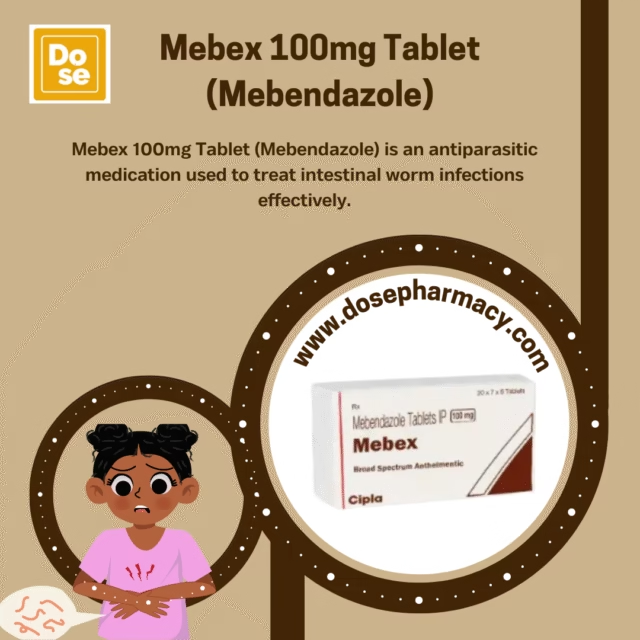Mebendazole over the counter is a widely used antiparasitic medication known for its effectiveness in treating a range of worm infections. From common pinworms in children to more severe infestations like roundworms and hookworms, mebendazole is often the first line of defense. Understanding how this medication works, what it treats, and how to use it correctly can ensure safe and effective results.
What Is Mebendazole?
Mebendazole is an anthelmintic, meaning it kills parasitic worms. It’s available in tablet or liquid form and is typically prescribed to treat intestinal worm infections in both adults and children. This medication works by blocking the worms’ ability to absorb glucose, which leads to their eventual death due to energy depletion.
Mebendazole is included on the World Health Organization’s List of Essential Medicines, highlighting its importance in global healthcare.
Conditions Treated by Mebendazole
Mebendazole is effective against a variety of intestinal worms. These include:
1. Pinworms (Enterobius vermicularis)
- Most common in children.
- Causes intense anal itching, especially at night.
- Easily spread among family members or in schools.
2. Roundworms (Ascaris lumbricoides)
- Can grow up to 13 inches in length.
- Infection occurs through contaminated food or water.
- May lead to abdominal pain, malnutrition, or intestinal blockage.
3. Whipworms (Trichuris trichiura)
- Lives in the large intestine.
- Can cause diarrhea, abdominal pain, and weight loss.
- Common in tropical and subtropical climates.
4. Hookworms (Ancylostoma duodenale and Necator americanus)
- Enters through the skin (usually feet) from contaminated soil.
- Can cause anemia, fatigue, and protein deficiency.
5. Other off-label uses
- Occasionally used for strongyloidiasis and tapeworms, though albendazole is often preferred in these cases.
How Does Mebendazole Work?
Mebendazole works by disrupting the energy production of parasitic worms. Specifically, it inhibits the uptake of glucose and interferes with microtubule formation in the cells of the worms. This starves the worms of energy, making them immobile and eventually killing them. The dead worms are then passed out of the body through the stool.
Because mebendazole acts locally in the intestines, it does not require absorption into the bloodstream to be effective.
How to Take Mebendazole
Proper usage is crucial for ensuring the drug works effectively and preventing reinfection.
1. Dosage Guidelines
- Pinworms: A single 100 mg dose. Often repeated after 2 weeks to prevent reinfection.
- Roundworms, whipworms, hookworms: 100 mg twice daily for 3 days.
- Children under 2: Use with caution. Consult your pediatrician.
2. With or Without Food?
Mebendazole can be taken with or without food. However, taking it with a fatty meal may increase absorption and effectiveness, especially for more stubborn infections.
3. Crushing or Chewing
- Tablets can be chewed, swallowed whole, or crushed.
- For children, the tablet can be crushed and mixed with a spoonful of soft food like yogurt or applesauce.
Safety Tips for Taking Mebendazole
✅ Follow Prescribed Doses
Don’t exceed the recommended dosage unless advised by a doctor. Overdosing may cause side effects like nausea or abdominal discomfort.
✅ Hygiene Matters
For infections like pinworms, reinfection is common. Combine medication with hygiene practices:
- Wash hands frequently.
- Keep fingernails short.
- Change bed linens and underwear daily.
✅ Treat Household Members
Pinworms spread easily, so doctors often recommend treating all household members, even if they show no symptoms.
Side Effects of Mebendazole
Most people tolerate mebendazole well. However, some may experience mild side effects, including:
- Abdominal pain or cramps
- Nausea
- Vomiting
- Diarrhea
- Gas
In rare cases, allergic reactions (rash, itching, swelling) or serious side effects like liver issues or decreased white blood cells may occur. Seek medical help if any severe symptoms arise.
Who Should Avoid Mebendazole?
While safe for most, mebendazole isn’t suitable for everyone:
- Pregnant women (especially first trimester): It’s generally avoided unless the benefits outweigh the risks.
- People with liver disease: Use with caution and under medical supervision.
- Children under 1 year: Not routinely recommended unless necessary.
Always consult a healthcare provider before starting the medication.
Reinfection and Prevention
Mebendazole kills existing worms, but it doesn’t prevent future infections. To prevent reinfection:
- Wash hands after using the bathroom and before meals.
- Wash bedding, towels, and clothing regularly.
- Keep fingernails clean and avoid nail biting.
- Clean toilet seats and bathroom surfaces regularly.
Mebendazole vs. Albendazole
While both medications treat similar conditions, there are some differences:
| Feature | Mebendazole | Albendazole |
|---|---|---|
| Spectrum | Broad, mainly intestinal worms | Slightly broader, including tissue parasites |
| Dosage Form | Tablets, chewable tablets | Tablets, suspension |
| Absorption | Poor (mostly acts locally) | Better absorbed with fatty food |
| Use in Hydatid Disease | Not effective | First-line treatment |
Your doctor may choose either depending on the type and severity of infection.
Final Thoughts
Mebendazole is a safe, effective, and accessible treatment for many common intestinal worm infections. When used properly, it not only alleviates symptoms like itching, abdominal pain, and fatigue but also helps prevent complications such as malnutrition and anemia.
Combining mebendazole treatment with good hygiene practices is essential for long-term protection and breaking the cycle of infection—especially in households and communities where these parasites are common.
If you or your child shows signs of a worm infection, consult your healthcare provider to confirm the diagnosis and determine whether mebendazole is the right treatment for you.







[…] If you are pregnant, breastfeeding, or have other medical conditions. […]